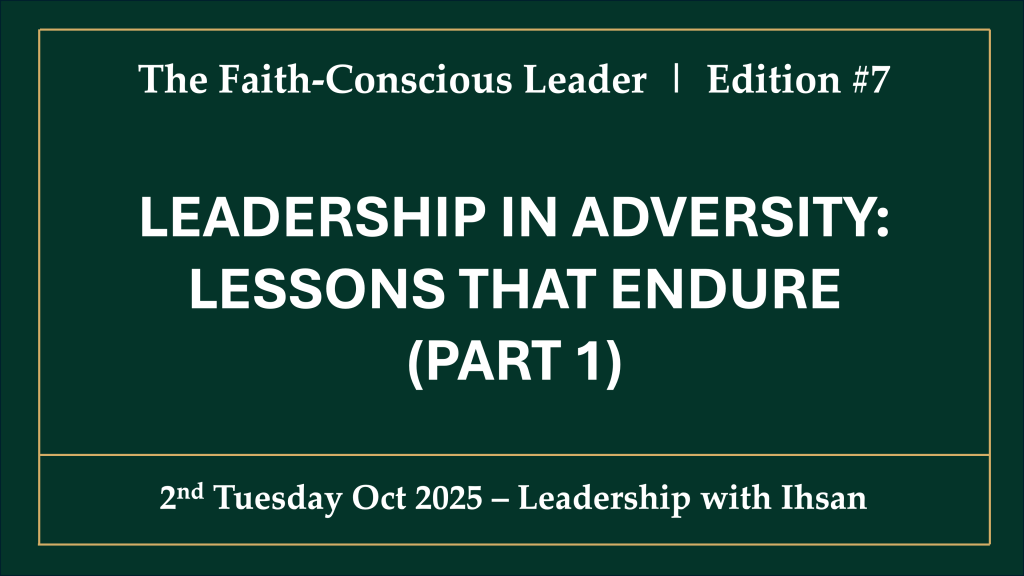Leadership in Adversity: Lessons That Endure (Part 1)

– Learning from the Prophet ﷺ and from our own journeys through challenge
THE PROPHET ﷺ AS THE HALLMARK OF LEADERSHIP
I chose Leadership in Adversity as this week’s article because this year had me face four months of adversity, i.e. my sickness, before I got out of it. View video excerpt below from The Bypass Files:
(If you can’t view the video above, click here.)
Then I wanted to check how our Prophet ﷺ dealt with adversity.
Thank you for the book Prophet Muhammad ﷺ – The Hallmark of Leadership by good friend Brother Dr. Azman Hussin, together with co-authors Dr. Rozhan Othman and Dr. Tareq Al-Suwaidan, the whole of Chapter 12 allows us to extract important lessons on facing adversity, modelled by the Prophet ﷺ:
⓵ Resilience with Faith
⓶ Realism and Planning
⓷ Depersonalizing Leadership
⓸ Keeping the Big Picture
⓹ Leading from the Front
⓺ Learning from Others
⓻ Courage with Compassion
In this edition, I’ll reflect on the first three of the above seven lessons. These mirror what I continue to experience in my own renewal and what I witnessed in the leaders I coach or the leadership challenges I went through in my corporate experience.
MERE MORTALS CAN!
Lest we think that leadership by Prophet Muhammad ﷺ, the No. 1 Most Influential Person in history, is something that we ordinary mortals cannot emulate, remember, he was a normal human being to begin with:
“Say [O Muhammad]: ‘I am only a mortal like you. It is inspired in me that your Allah is One Allah, therefore take the straight path unto Him and seek forgiveness from Him. And for unto the idolaters.’” – Quran 41:6
As the book authors say, “Muhammad ﷺ felt pain when he is injured, he endured hunger during famine, he experienced sorrow when dear ones passed away. He loved his family like most of us, he enjoyed the company of his companions and he jokes and teased them during casual interactions.”
LESSONS THAT ENDURE
Adversity can be the uncertainty of a diagnosis, the shock of a corporate crisis or the quiet exhaustion of holding things together for others. Those moments can really test our character.
Lesson 1: Resilience with Faith
At Ta’if, rejected and attacked until he bled, instead of being in anger and vengeance, the Prophet ﷺ turned to Allah in surrender. He acknowledged his weakness, yet reaffirmed his purpose. That du’a became a turning point of quiet strength.
Our default reaction would usually be defiance. The Prophet ﷺ showed us that resilience means surrendering with trust, then rising again with clarity.
When I awoke from surgery with my family at the bedside, I kept repeating “Alhamdulillah” (my wife said she lost count how many times), knowing that I had trusted Allah and he made me survive a bypass procedure that a close friend two months earlier didn’t. At that point, my praise to Allah was also my forward-looking trust in Him that I would be reclaiming my normal self soon, all with his ease and permission. Sure enough, two to four months later I painfully arrived at my new normal. Alhamdulillah again.
Lesson 2: Realism and Planning
At the Battle of Badr, the Muslims were vastly outnumbered 313 against nearly 1,000. Yet the Prophet ﷺ didn’t rely on hope alone. He consulted, planned, positioned his troops and prayed with urgency.
His example reminds us that faith alone is not enough. Planning and implementation perfects it.
In my corporate days, I could have been laid off twice, both times I felt would have been disastrous for me.
In the 1990’s, the global company was nearly bankrupt and many of my team members were given a severance “package” to leave. The new global CEO took about ten years to turn around the company. If that was how long it needed to implement changes, he succeeded.
My second threat of termination was of my own doing. I could no longer “fit” the available job roles in the company. It took a couple of months of acknowledging my past deficiencies, diligently and creatively influencing management to re-create a job role I once held that had been dissolved, being refused the approved job, then finally persuading them I am the right person. They gave me the position and later promoted me once, before I left on my own accord for an outside opportunity.
Be realistic, pray hard and work hard!
Lesson 3: Depersonalizing Leadership
When personal attacks came, like the painful slander against his wife ʿAishah (May Allah be pleased with her), the Prophet ﷺ did not lash out! He upheld due process, trusted in divine timing and refused to use power to silence others.
Leaders often default to make everything personal, be it for praise or criticism. But the Prophet’s way teaches that ego clouds judgment; humility clears it.
My ego had me think a client was unfair in terminating our coaching engagement, and I gave him partial refund. So at first I wanted to stay away from “unappreciative people,” him and others “like him.” Then some time later (credit to him), he contacted me again saying he still followed me on social media and that he wanted to talk some more. My heart opened up and we chat regularly now. I simply remember that my mission is to help people. I trust that Allah will help me with my further helping him.
COMING NEXT MONTH (PART 2)
In Part 2 (2nd Tuesday next month), I’ll explore the remaining four lessons extracted from the book:
⓸ Keeping the Big Picture
⓹ Leading from the Front
⓺ Learning from Others
⓻ Courage with Compassion
Together, they complete the portrait of the Prophet ﷺ as a leader whose humility and faith transformed every hardship into progress.
THIS WEEK’S REFLECTION AND CLOSING INVITATION
Adversity refines leaders, if we let it.
Every challenge, whether personal or professional, is an invitation to realign with what matters most.
What has adversity taught you about your own leadership?
I hope to hear your reflections. Please comment below, or join our Faith-Conscious Professionals conversations.
📅 Next session: 3rd Wednesday of every month
🔗 Details: https://www.linkedin.com/events/
Looking forward to seeing you there, insha Allah.
